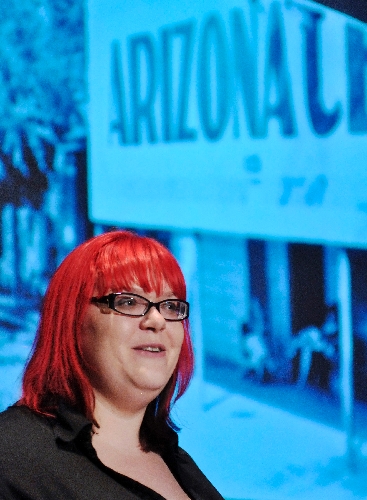Red light lectures share valley’s colorful prostitution history
When Marie Rowley saw an article in the Las Vegas Review-Journal about a group of women charged with prostitution, it sparked the history student in her.
"The article showed photos of a bunch of women arrested for prostitution," Rowley said. "It raised a lot of controversy, because these women weren't convicted yet, only arrested. It made me think about the city's attitude about prostitution and how that has changed over the years."
Rowley decided to write her master's thesis on the subject of the valley's brothels. With her master's in history at the University of Nevada, Las Vegas completed, she plans to pursue a doctorate in history in Chicago.
Prostitution was never legal in the city of Las Vegas, but at times, it wasn't exactly illegal. Rowley found that the city charter gave officials the power to decide on the legality of prostitution in the city, but they never officially made the decision.
"It was an official and openly debated part of the city," Rowley said. "The sheriff's department was basically four people, and among their duties was keeping the peace in Block 16. There was a city health inspector on the payroll whose main job was checking out the working girls."
Rowley started her research with Block 16, the infamous red light district that dominated the valley's brothel industry from the founding of the town in 1905 until the late '30s. While most histories of the valley discuss Block 16, fewer histories mention operations outside the boundaries of the city. Among the things Rowley was interested in was the larger story that wasn't being told.
Rowley found that brothels are a subject that hadn't been studied in depth . When she contacted institutions with historical collections, she frequently discovered that there was no specific collection on brothels.
"They would say they didn't have anything on the subject. So I'd go at it from a different angle," she said. "Frequently they had a lot of material they didn't know about related to prostitution and brothels, but it wasn't collected together or obvious. I found a lot of people who were surprised to find out they had so much on the subject."
While working on her project, Rowley was asked if she was working with Patrick Gaffey, cultural program supervisor for Clark County. Gaffey worked on a history of The Meadows, a brothel and nightclub with a storied history near the intersection of Charleston Boulevard and Boulder Highway. Rowley said when they finally met, they immediately clicked.
"She is such a great historian," Gaffey said. "She dug deep and found out things that nobody has really sorted out in years."
When Gaffey read Rowley's initial manuscript, he found what he thought was an obvious and glaring error. She ascribed the closure of the brothels in Block 16 to a real estate deal.
"All the books out there say that the federal government pressured the city into closing down Block 16 when they were establishing the gunnery school (which later became Nellis Air Force Base)," Gaffey said. "I double-checked her research, and she's right. There was a guy buying up all the property in Block 16, and he pressured the council into shutting it down, because he could make more money by converting them to hotels."
Gaffey asked Rowley to turn her thesis into a lecture series. She already has presented the first part of the series, focusing on Block 16, at the Cora Coleman Senior Center and the Winchester Cultural Center. The next lectures are scheduled at 11 a.m. and 6:30 p.m. Wednesday and July 11 at the Winchester Cultural Center, 3130 S. McLeod Drive. Wednesday's lectures are set to focus on brothels in World War II. July's subject is Roxie's on Boulder Highway. Admission is free.
Rowley is considering turning her thesis into a book. Based on the response from her first lecture, there may be enough interest in the subject to warrant that.
"I hope she does make it into a book," Gaffey said. "I think it would sell."
For more information on the lectures, call the Winchester Cultural Center at 455-7340 or visit clarkcountynv.gov.
Contact Sunrise/Whitney View reporter F. Andrew Taylor at ataylor@viewnews.com or 380-4532.

















